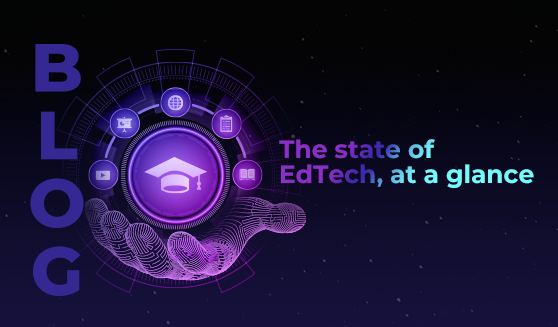
Is GenAI the key to building smarter cities?
Learn how generative AI is unlocking the true potential of digital twins – to make smart cities more efficient, inclusive, and citizen-focused.


Educational technology has the potential to increase inclusivity across education, improve student outcomes, and enable a more personalised approach to learning. It’s a broad sector of the tech industry – covering everything from the digital tools that allow students to submit homework on a network, to mobile learning platforms, AI-powered robots (like ROYBI, created by LEAP speaker Elnaz Sarraf), and gamified XR experiences.
According to GlobalData, the edtech market size will reach a value of USD $270.5 billion in 2023, and is expected to grow at a CAGR of 16.0% until 2026.
Data from Emergen Research predicts that the adaptive learning market size will reach $9.11 billion by 2028 – as it becomes increasingly clear that an individualised approach helps students to get the most from their learning. And Technavio estimates that the K-12 game-based learning market will grow by 20% each year until 2025, with the US and Canada expected to make up more than a third of that growth.
At LEAP, we love seeing edtech innovators share their work. Because not only are they pushing the boundaries of what’s possible with technology, they’re also creating invaluable opportunities for new generations – and inspiring the people who’ll shape our global future.
As well as the talented tech minds we meet at LEAP, we’ve always got an eye on the wider industry – because there’s something new to be found around every corner.
Here are some of the edtech companies we’ve been inspired by so far this year:
Not all edtech is designed for use in the classroom; many products and services are specifically geared towards improving learning opportunities outside of conventional school settings. But some edtech is developed to support in-school education – and that leads to the question:
Do teachers want more tech in their classrooms?
There has been ongoing resistance to technological changes within classrooms and schools. But this isn’t just because teachers don’t like tech. A new report by the British Educational Suppliers Association reveals that educators estimate 84% of edtech tools are poorly implemented – and one survey found that only 8% of educators trust the claims made directly by edtech companies about the efficacy of their tools.
Educators don’t want to consume company marketing material. They want evidence. Sticking with the UK for a moment, the Department for Education’s 2021 edtech survey found that 50% of teachers say lack of staff knowledge about what products do is the main barrier to using edtech in schools. And as well as understanding the purpose of educational technology, teachers want clear, independent evidence that the products really work.
Which makes sense. Educators are very busy people; they don’t have the time to try out a range of different products before they land on one that works, and they don’t want to risk their students’ learning outcomes in the process.
Technology companies and tech researchers need to work harder to provide educators with the information, resources, and training they need to use edtech confidently.
Because as Mads Skrubbeltrang (Rector at Ørestad Gymnasium) said in this interview for the LEAP blog,
“As long as you have teachers who explore the technological opportunities and use them in the classroom – then you can go far with technology as an innovative tool. It is the mindset of the teachers which is important. When the teachers see the technology as something that you need to explore and spend time and effort to learn to use - then you can create an innovative environment for the students.”
“If more students have access to tech,” Skrubbeltrang added, “then hopefully more young people around the world will communicate more, and thus become more culturally aware and be able to learn more about other cultures. The more we know about other cultures and the more we cooperate with students from other cultures, the easier it will be to understand and sympathise with people around the world.”
“That's how we should use technology when we discuss the role of tech and its impact on wider society.”

Learn how generative AI is unlocking the true potential of digital twins – to make smart cities more efficient, inclusive, and citizen-focused.

The smart cities of the future will use tech to lower emissions, cut urban temperatures, and improve quality of life in highly populated areas.

Discover the cities that rank highly for smart city preparedness, and learn why locally relevant innovation is more important than cutting-edge tech.

Learn how generative AI is unlocking the true potential of digital twins – to make smart cities more efficient, inclusive, and citizen-focused.

The smart cities of the future will use tech to lower emissions, cut urban temperatures, and improve quality of life in highly populated areas.

Discover the cities that rank highly for smart city preparedness, and learn why locally relevant innovation is more important than cutting-edge tech.